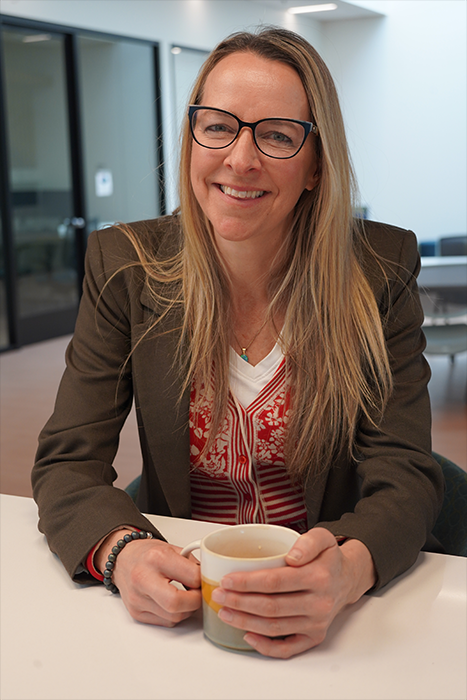Try as they might, governments have struggled to solve some of society's most intractable challenges: homelessness, unemployment, systemic inequities. Despite billions of dollars poured into social programs, these problems endure, raising a difficult question are traditional funding models getting results?
A growing movement argues that social spending should be tied to measurable results rather than institutional inertia. This is the premise behind "outcomes procurement," a concept quietly making waves in Alberta.
While it might sound like wonkish jargon, the idea is simple: fund success, not effort. Advocates believe this shift in thinking could fundamentally reshape the way social programs are designed, delivered and evaluated.
At the centre of this movement is the Institute for Community Prosperity at Mount Royal University, a hub of social innovation, systems learning and community engagement on campus.
One of the Institute's latest projects, StartWork, uses an outcomes procurement model to help refugees secure meaningful employment in Canada an initiative as much about dignity and belonging as it is about making a living.
Barb Rallison, associate director at the Institute for Community Prosperity, is one of the biggest proponents of a dollars-for-deliverables approach.
For Rallison, outcomes procurement is a necessary correction to an outdated funding model. Traditionally, social programs compete for finite government grants, often focused more on sustaining operations than delivering lasting change.
In efforts such as StartWork, Rallison sees enormous potential to transform how governments fund social good.
"Outcomes procurement is a smart, forward-thinking way to get the results communities need," she says. "By linking funding to measurable outcomes, we're empowering organizations to tackle the real challenges identified by governments, rather than forcing these agencies to compete with each other over scarce resources to preserve the status quo.
"This approach fosters collaboration across the social sector, unlocking new opportunities to deliver solutions that truly make a difference for the people we serve."
StartWork: Helping refugees build careers in Alberta
StartWork began in 2024 as a conversation between the Institute for Community Prosperity at Mount Royal University and the Alberta Ministry of Assisted Living and Social Services, which was keen to explore ways to reduce Alberta Income Support caseloads, a significant cost centre for the ministry.
Thanks to the visionary support of the Northpine Foundation, this initiative has become a reality. The Northpine Foundation is a Canadian philanthropic organization that invests in innovative projects and ventures aimed at improving the lives of marginalized populations across Canada.
"We were excited about this investment opportunity because of the innovative approach to provide meaningful employment outcomes for refugees. StartWork provides comprehensive support to refugees while delivering resources accordingly and if it fails, there is no expense to the taxpayer," says Aatif Baskanderi, CEO of Northpine.
"The approach also shows ingenuity of the Government of Alberta in trying something new and effective. There are many ways that the Canadian taxpayer and our social systems deeply care and invest in our communities with the hopes to build our society better. This approach provides an example that can be used across Canada to help deliver better outcomes for those in need while reducing strain within the public service, at a lower cost and no risk to the taxpayer."
In response the Institute for Community Prosperity is now keenly focused on helping refugees move off Alberta Income Support by overcoming systemic barriers to employment.
For refugees, many of whom arrive in Canada with advanced degrees and professional experience, the path to meaningful work is littered with obstacles. StartWork's model aims to bridge that gap, helping participants gain the certifications, skills and confidence needed to succeed in Alberta's workforce.
The pilot launched in late 2024 with an overwhelming response nearly 300 applicants showed up to vie for just 40 spots.
Once accepted, members of the inaugural cohort were able to choose from one of four career paths: hospitality and food services, residential and commercial cleaning including commercial kitchen fire inspection, warehouse readiness and forklift certification, or carpentry. Participants completed employment training in early 2025 and transitioned into jobs. Refugee-serving organizations including Women in Need Society (WINS), Momentum, Fire X3 and the Centre for Newcomers partnered with StartWork to provide employment support. StartWork also provides on-demand support for participants including access to driver's training and courses to enhance English literacy.
Success is defined by the participants' ability to remain off government support for at least two years. Only then will the provincial government compensate the Institute.
Learning from others

Barb Rallison is the associate director of MRU's Institute for Community Prosperity and is a proponent of outcomes procurement.
The idea of linking public spending to outcomes has existed for some time.
The United Kingdom pioneered "social impact bonds" in 2010, tying funding to outcomes like reduced recidivism or improved employment. Two years later, Massachusetts launched one of the first versions in the United States to help formerly incarcerated individuals reintegrate into society.
While social impact bonds were initially hailed as a game changer, Rallison believes they have fallen short of expectations. Instead, the MRU Institute is piloting an alternative approach, which she describes as simpler, more government-friendly and easier to replicate.
Outcomes procurement doesn't require complex financial structures. Instead, it often leans on things governments are already doing.
Rallison points to examples of this approach in action. In Manitoba, Aki Energy, through Raven Indigenous Capital Partners, is selling utility bill reductions to the Government of Canada. Meanwhile, in Scandinavian countries, governments are paying nonprofits for every pre-diabetic individual who does not develop diabetes within three years.
A model for the future
In Alberta, the success of StartWork could pave the way for broader adoption of outcomes procurement. According to Rallison, the provincial government has already expressed interest in expanding the model, seeing it as a cost-effective and impactful solution to long-standing social and economic issues.
"We know there are many community organizations transforming lives," Rallison says. "The opportunity with outcomes procurement is to unlock new resources so these organizations can have even greater impact without the constraints of traditional funding models.
"It's about reimagining how we approach social challenges and creating solutions that are both innovative and sustainable."
Rallison gives her thanks to the Northpine Foundation and the provincial government for its support of the pilot project. Given the novelty of this approach, she also expresses gratitude to MRU's legal services team and University leadership.
StartWork participants have already shown significant commitment and enthusiasm. For example, the first person to receive a Canadian driver's licence described it as a "life-changing moment."
"I gained the skills and confidence to succeed not just in driving, but in building a better future," said the participant.
Stories like these highlight the initiative's potential to empower individuals and communities alike.
As the initiative evolves, the Institute plans to share its learnings through community-facing publications, case studies and public events.
Leading the way: How the Institute sparks social innovation
The Institute for Community Prosperity at Mount Royal University has long been a champion of transformative change, empowering individuals and organizations to tackle complex challenges with innovative solutions.
Through initiatives like StartWork, the Institute demonstrates its commitment to creating lasting social impact by bridging immediate community needs with a broader vision for systems-level change.
"The Institute, under the leadership of Executive Director Lena Soots-Haley, has shown tremendous success in impactful work that engages community and includes students in applying systems thinking to solve some of our most pressing problems," says Dr. Connie Van der Byl, PhD, associate vice-president of the Office of Research, Scholarship and Community Engagement.
The StartWork initiative also reflects priorities in MRU's 2023-2030 Academic Plan, which focus on building stronger community connections.
Dr. Chad London, PhD, Provost and Vice-President, Academic, sees the initiative as a powerful example of how universities can address complex societal challenges by bridging education with economic and social impact.
"StartWork exemplifies how MRU's research institutes are driving real change," London says. "By applying an outcomes-based approach to social challenges, this initiative creates meaningful employment opportunities that provide lasting benefits for the participants and the broader community.
"It's about equipping people with the skills and confidence to thrive in Alberta, while demonstrating how innovative funding models can strengthen the social and economic fabric of our province."









